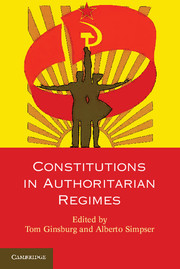Book contents
- Frontmatter
- Contents
- List of Contributors
- 1 Introduction
- Part I The Category
- 2 Ruling against Rules*
- 3 Authoritarian Constitutionalism
- Part II Constitutional Design in Authoritarian Regimes
- Part III Contents of Authoritarian Constitutions
- Part IV Consequences of Authoritarian Constitutions
- Index
- References
3 - Authoritarian Constitutionalism
Some Conceptual Issues
Published online by Cambridge University Press: 05 June 2014
- Frontmatter
- Contents
- List of Contributors
- 1 Introduction
- Part I The Category
- 2 Ruling against Rules*
- 3 Authoritarian Constitutionalism
- Part II Constitutional Design in Authoritarian Regimes
- Part III Contents of Authoritarian Constitutions
- Part IV Consequences of Authoritarian Constitutions
- Index
- References
Summary
Legal scholars and political theorists interested in constitutionalism as a normative concept tend to dichotomize the subject. There is liberal constitutionalism of the sort familiar in the modern West, with core commitments to human rights and self-governance implemented by means of varying institutional devices, and there is authoritarianism, rejecting human rights entirely and governed by unconstrained power holders. Charles McIlwain's often-quoted words exemplify the dichotomization: “[C]onstitutionalism has one essential quality; it is a legal limitation on government; it is the antithesis of arbitrary rule; its opposite is despotic government, the government of will instead of law,” and “[a]ll constitutional government is by definition limited government” (1947: 20–1).
This chapter explores the possibility, perhaps implicit in a restrained understanding of McIlwain's formulation, of forms of constitutionalism other than liberal constitutionalism. After describing two possibilities – absolutist constitutionalism and “mere” rule-of-law constitutionalism – the chapter examines in more detail what I call authoritarian constitutionalism. That discussion is connected to recent literature in political science on hybrid regimes that have been labeled variously electoral authoritarianism (Schedler 2006) and competitive authoritarianism (Levitsky and Way 2010). The literature in political science is more concerned with the conditions for the emergence and stability of hybrid regimes than with normative issues, but some parts of the literature shed light on normative issues, as does the related literature on the functions of constitutions and courts in truly authoritarian regimes. Drawing on these literatures, this chapter outlines some characteristics of authoritarian constitutionalism understood normatively.
- Type
- Chapter
- Information
- Constitutions in Authoritarian Regimes , pp. 36 - 50Publisher: Cambridge University PressPrint publication year: 2013
References
- 15
- Cited by



